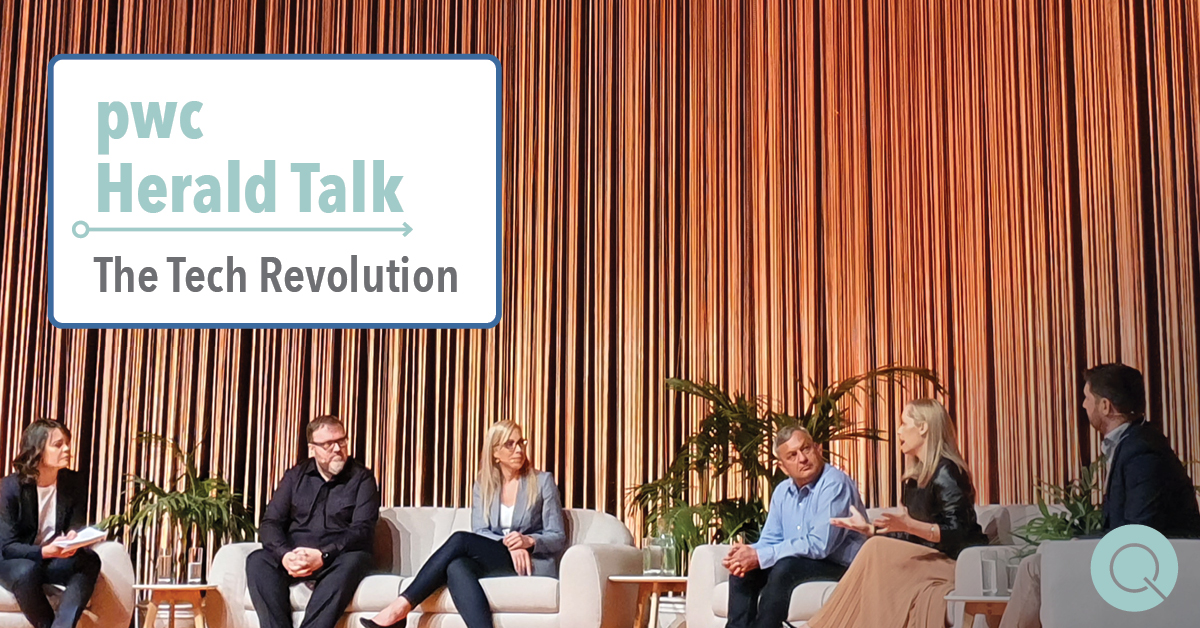
Last Friday I attended the pwc HeraldTalks November event – The Tech Revolution. As a takeaways I grabbed three novel ideas and questions that can help businesses take a different view on how to apply technology to their operating models or how to start thinking about digital transformation from a new perspective.
The event hosted by Simon Dallow opened with some of the usual questions and sentiment like “ignore the potential of technology at your own peril” and “how able is your business to adopt, monetise and realise the benefit of technology?”.
And the key messages throughout were all consistent. Don’t miss what is happening because it is appearing to happen gradually - Technology gains and advancements do not discriminate against industries or sectors and the impacts of technological advancement will reach far and wide.
The market over the last few years has certainly been driven by a healthy dose of hype around a revolution with many (guilty on this count) referring to ‘the fourth industrial revolution’ - even the name of the event. One of my favourite questions from the audience was “is this a revolution of an evolution” which was aptly answered by Vikram Kumar quoting a saying in the tech sector that
“Technology is over-hyped in the short-term but under-estimated in the long-term”
An interesting claim made by the Key-Note speaker Paul Spain, is that New Zealand is lagging behind in the adoption technology.
In many respects we are racing ahead as a nation. Paul, referring to the TIN (Technology Investment Network) report stated that New Zealand’s tech exports have now reached $1 Billion annually and could become our largest export within five years.
Having recently returned from the Ai Summit in San Fransisco (see my last article) and my own experience with New Zealand enterprise, the view I hold is that the largest players in the market are both investing and keeping pace with global change however Paul was specifically pointing to medium and large enterprise.
Grabbing some older data (for ease of access) 85% of businesses in New Zealand have revenue ranging from $10 - $99 Million. Given the representation of medium and large enterprise this could be viewed as a risk to our business demography.
One of the key barriers sighted by Paul was the lack of digital leadership in large enterprise.
They have I.T. leaders, but the job and remit tend to be linked to the fundamental infrastructure and support for technology in the business. In contrast the leading enterprises both locally and globally have (a scale which allows) dedicated resources and teams devoted to the advancement of AI and digital capability. And according to a U.S report by Deloitte these enterprise are extending their investment significantly.
I also liked an interesting point made by Angie Judge that New Zealander’s are not afraid to try something but we’re slow to follow-through with investment.
We’re quick to put our toes in the water, but slow to jump in – and we’re missing out on the up-take.
Angie specifically compared New Zealand to the U.S who in her view may be slower to start but are very good at following through with investment and organisational wide adoption of capability once they believe something is proven.
The message – we have to move faster. We have to find ways to become more agile. This was perhaps best described by Lidsay Zwart, Business Director for Vodafone New Zealand, when she said”
“It used to be big eat small. Now it’s fast eat slow”
Introducing a healthy dose of pragmatism, I really liked how most of the panellists were clear that we don’t start with technology. The opportunity is to bring the focus back to business problems – this is the only way to ensure you add value and create capability that is relevant to a business.
How do businesses start to think about how to create future-ready operating models and rethink how they operate based on technology and digital advancement?
Three points that will help you think about digital transformation in your business:
1. Burn your business (Metaphorically)
Paul Spain posed a great question to the audience. “What would your organisation look like if it was burned to the ground and you had to rebuild it? How would your business be designed differently? A great way to think about how your business could be transformed without the constraints of your current model.
2. Build a bigger moat
Another great perspective from Vikram Kumar was to focus on understanding what your core competitive competencies are and then determine how technology can be used to achieve material advancements to those aspects of your business. To steal the words of Warren Buffett – Build a bigger moat.
3. Solve market problems
My favorite perspective came from, Jamie Famer, a former colleague, who during a quick post event chat said (paraphrasing here) “the opportunity is not to solve business problems, it’s to solve market problems. Stop talking about technology. Stop talking about our current business problems. Understand the customers you serve and the market you operate in and focus on the problems you are solving. Focus on how you could solve problems better with technology, or what problems are not being solved that could now be solved.
